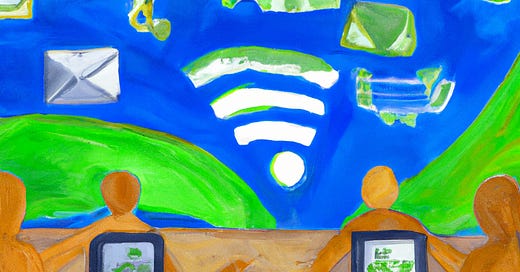Digital Platform Policy Highlights - Digest 29
Q1 2024 to Q3 2024 Policy Changes: This post dives into how big tech (mostly Apple?) is tweaking their platforms and policies to keep up with the EU’s regulatory pressures. 🚨
This post is part four of a series documenting policy changes and feature improvements introduced by platforms in Q1 2024 to Q3 2024.
TL; DR→ Here are policy changes to address external regulations:
Amid legal pressure, Apple allows apps to use external payment platforms
Apple to allow third-party capability for NFC payments on iPhones
WhatsApp to Support Interoperability with Other Messaging Apps
Amid legal pressure, Apple allows apps to use external payment platforms
In 2021, the ruling in the Apple vs. Epic Games court case required Apple to permit developers to direct users to alternative payment methods outside the App Store. Apple now allows these external links, however it imposes a 27% commission on transactions conducted through outside payment methods (or 12% for small businesses). In the EU, Apple’s approach is slightly different: Apple has allowed external payments but with 10 to 17% commission fee. In Korea, it’s around 26-27%. The trade-off between providing developers with more choices and Apple’s desire to retain a share of the revenue is far from settled. (link)
Apple to allow third-party capability for NFC payments on iPhones
Apple will allow third-party mobile wallet and payment providers to access the iPhone's NFC feature as part of its efforts to address European Commission antitrust concerns. This comes after EU regulators pressured Apple to loosen its restrictive policies to foster fair competition in the mobile payments market. How does this work? Basically Apple now supports multiple wallets in EU and users can choose their default wallet app in settings. Any user with their Apple ID from the EU can use this wallet outside of EU. But it is unclear if non EU users will ever get this option, even inside EU. (link)
Meta to Allow EU Users to Unlink Social Media Accounts
Meta will permit users in the European Union to unlink their Instagram, Facebook, and Messenger accounts in response to the Digital Markets Act (DMA). For example, Europeans will be able to use Facebook Messenger without a Facebook account. Even Google stopped sharing of data between services like Search, Youtube, Google Maps, and Chrome. The DMA specifically focuses on 6 “gatekeepers”: Alphabet, Amazon, Apple, ByteDance, Meta and Microsoft and disallows gatekeepers from activities like self-preferencing, data combining, “forced” bundling, etc. (link)
Apple to Allow Third-Party App Stores on iPhones in the EU
Apple will permit third-party app stores and sideloading on iPhones in the European Union in response to the EU's Digital Markets Act (DMA). This move aims to reduce Apple's control over the iOS platform, fostering competition and allowing developers to bypass Apple's 30% revenue cut. However, Apple has imposed conditions, including a €0.50 “core technology” fee for each app installation after the first 1 million in that year via third-party stores and a requirement for Apple to approve all apps offered. Someone did a back-of-the-envelope calculation to suggest that Apple could rake in €6.2 million from a side-loaded app earning €10 million. (link)
Apple Enables Alternative Browser Engines in iOS 17.4
With the release of iOS 17.4, Apple will allow alternative browser engines on iPhones within the European Union. This policy change means browsers like Chrome and Firefox can now operate with their own underlying engines (Blink and Gecko, respectively) instead of being forced to use Apple’s WebKit. As a result, browsers will be free to innovate and offer competition to WebKit, meaning Europeans could see an improvement in their browser’s performance. But again, only for those with their Apple IDs registered in EU. (link)
Apple Relaxes 'Sign in with Apple' Requirement
Apple has revised its App Store guidelines, no longer requiring apps using third-party log-in options (think those “Sign in with Google” buttons) to also include "Sign in with Apple." But because of the EU’s DMA, Apple has relaxed this requirement as it would unfairly favor their own service otherwise. Interestingly, this is also in effect in the US with a small change. Developers must offer an additional login service that meets certain privacy criteria. While the new guidelines give developers in the US more flexibility, many apps may find it easy to continue using "Sign in with Apple" to comply. (link)
WhatsApp to Support Interoperability with Other Messaging Apps
To comply with the EU’s Digital Market Acts, WhatsApp plans to make its app interoperable with other messaging services, while maintaining encryption. In other words, WhatsApp users would be able to communicate with users on other platforms like iMessage and Signal (provided those platforms also support interoperability). While this is an important step towards making life easier for consumers (reducing the need to use many different messaging apps to be able to talk to everyone), Whatsapp could still undermine the effectiveness of this change by using technological limitations as a reason. Consider iMessage: its users can talk to Android users over SMS, but the “blue bubble, green bubble” phenomenon is real. (link)
Research help from Jennifer Xie, Angelina Wang, John Mai, Marshall Singer, Anantesh Mohapatra and Anna Li (Thanks a ton, folks!)
Thank you for reading Platform Policy Research. If you know someone who like this stuff, please share it with them :)



